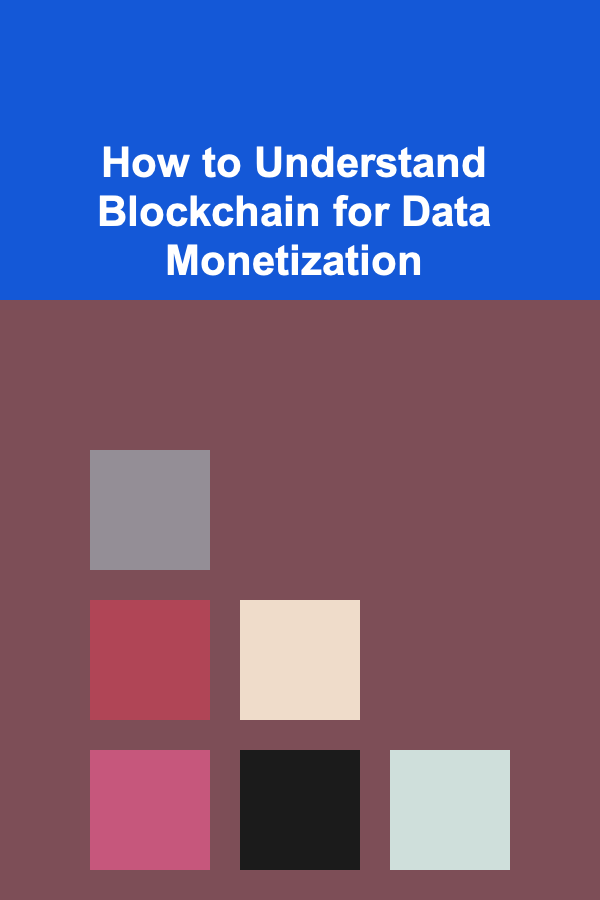
How to Understand Blockchain for Data Monetization
ebook include PDF & Audio bundle (Micro Guide)
$12.99$7.99
Limited Time Offer! Order within the next:

In the evolving world of technology, blockchain has emerged as a groundbreaking innovation with potential far beyond cryptocurrencies. One of the most compelling applications of blockchain is in data monetization --- a field that is gaining significant attention. With data becoming an essential asset in today's digital economy, the question of how to monetize this resource has become crucial for businesses, individuals, and even governments. Blockchain offers solutions that can address issues such as data ownership, privacy, security, and trust in data transactions.
This article will explore the relationship between blockchain and data monetization, detailing how the technology works, its potential to revolutionize data markets, and the challenges that come with implementing it. We will delve into the mechanics of blockchain, how it enables data ownership and privacy, the potential business models for monetizing data, and case studies of blockchain applications in this space.
What Is Blockchain?
Blockchain is a distributed ledger technology that ensures secure, transparent, and tamper-proof transactions. Initially designed for cryptocurrencies like Bitcoin, blockchain operates as a decentralized database that records transactions across multiple computers in a way that prevents tampering and fraud. Each block in the chain contains a set of transactions and is cryptographically linked to the previous one, creating an immutable and secure record.
Blockchain's key characteristics are:
- Decentralization: Instead of relying on a central authority, blockchain networks are distributed across numerous nodes (computers), which makes them resistant to tampering and censorship.
- Transparency: All participants in the network can access the ledger and view transactions, ensuring openness and trust.
- Immutability: Once data is recorded on the blockchain, it cannot be altered or deleted, providing a permanent and verifiable record.
- Security: Blockchain uses advanced cryptographic techniques to secure data, ensuring that transactions are legitimate and preventing unauthorized access.
These characteristics make blockchain an ideal solution for various industries, including data monetization, where the integrity, security, and transparency of data transactions are crucial.
Blockchain and Data Monetization
Data is often called the "new oil" because of its increasing importance in the modern economy. As organizations generate vast amounts of data, the question arises: how can this data be monetized? Traditional methods of data monetization involve selling or licensing data, but these models often face challenges regarding data ownership, privacy concerns, and intermediaries.
Blockchain can address many of these challenges by allowing individuals and organizations to retain control over their data while still enabling its exchange or sale in a transparent and secure manner. By utilizing blockchain, data owners can:
- Monetize their data directly: Through smart contracts and decentralized applications (dApps), data can be sold or licensed without intermediaries, leading to more efficient and cost-effective transactions.
- Maintain ownership and control: With blockchain, data ownership is clearly defined, and individuals or organizations can decide how their data is used, ensuring that they are compensated fairly.
- Enhance privacy and security: Blockchain ensures that data transactions are secure and that personal data is protected through encryption and decentralized storage.
- Create new business models: Blockchain enables innovative monetization models such as data marketplaces, where individuals and businesses can exchange data for cryptocurrencies or other tokens.
Key Blockchain Components for Data Monetization
Smart Contracts
Smart contracts are self-executing contracts with the terms of the agreement directly written into code. These contracts automatically execute when predefined conditions are met. For data monetization, smart contracts are crucial because they can automate data transactions, ensuring that payments are made once certain conditions are fulfilled, such as the exchange of data.
For example, if a company wants to buy consumer data, a smart contract can be set up so that once the buyer pays, the data is automatically transferred to them. This removes the need for intermediaries, reducing transaction costs and increasing efficiency.
Decentralized Data Marketplaces
A decentralized data marketplace is a platform built on blockchain that allows individuals or organizations to buy and sell data directly. These marketplaces enable a peer-to-peer exchange, where data owners have full control over their data and can decide who gets access to it.
Data marketplaces are typically powered by tokens or cryptocurrencies, which provide a seamless way for transactions to occur. Blockchain ensures that all data transactions are secure, transparent, and immutable. A significant advantage of decentralized marketplaces is that they eliminate the need for centralized intermediaries, such as data brokers, who often take a large cut of the revenue.
Tokenization of Data
Tokenization refers to the process of converting an asset, in this case, data, into a digital token that can be traded on a blockchain platform. Data tokens represent a piece of data that can be bought, sold, or traded in a marketplace. By tokenizing data, blockchain enables the fractionalization of data, meaning that smaller portions of data can be sold or exchanged, creating a new economy around data assets.
For example, a company may have large datasets that it wants to monetize. Instead of selling the entire dataset, the company can tokenize the data and sell smaller chunks, allowing for more granular control over how the data is distributed and monetized.
Data Privacy and Ownership
One of the key concerns with data monetization is ensuring that data owners maintain control and privacy over their personal information. Blockchain addresses this by providing an immutable, transparent record of who owns the data and how it is used.
In a blockchain-based data monetization system, individuals retain control over their data by holding private keys that give them access to their information. They can grant or revoke access to their data at will, and smart contracts ensure that only authorized parties can access the data. This makes it easier to enforce data privacy laws and regulations, such as the General Data Protection Regulation (GDPR) in the European Union.
Business Models for Blockchain Data Monetization
There are several potential business models for data monetization using blockchain technology. Some of the most promising include:
Data as a Service (DaaS)
Data as a Service (DaaS) refers to the sale or licensing of data through a blockchain-based platform. Organizations can offer their data to third parties through smart contracts, which automatically execute once the conditions are met. This model eliminates intermediaries, reducing costs and allowing for more efficient transactions.
For example, a company that collects consumer data may choose to offer that data as a service to advertisers or market researchers. Through blockchain, the company can set the price for its data and retain control over who can access it.
Data Exchange Networks
A data exchange network is a decentralized platform where individuals and organizations can trade data. These networks can function as a marketplace where users can exchange data for cryptocurrency or other digital assets. Data exchange networks typically use blockchain to ensure secure transactions, track data provenance, and ensure data privacy.
A key advantage of data exchange networks is that they empower individuals to monetize their data directly, rather than relying on large corporations or intermediaries. This could disrupt the current business models of data brokers and offer more equitable compensation for data owners.
Subscription-Based Models
In a subscription-based data monetization model, individuals or organizations can access data on a recurring basis in exchange for a fee. Blockchain can facilitate subscription payments through cryptocurrency, allowing for automated billing and transparent transaction history.
For instance, a company that collects sensor data could offer a subscription service to researchers who need regular access to that data. By using blockchain, the company can ensure that payments are secure, and the data is only accessible to authorized users.
Use Cases of Blockchain in Data Monetization
Healthcare Data Monetization
In the healthcare industry, patient data is one of the most valuable assets. Blockchain can enable secure and transparent transactions involving sensitive healthcare data, ensuring that patients retain control over their information while still allowing healthcare organizations and researchers to access and use the data.
For example, a patient may choose to share their medical records with a research institute in exchange for compensation. Blockchain ensures that the data is securely shared and that the patient's privacy is maintained. This model could also help improve the accessibility of healthcare data for research while ensuring that patients are fairly compensated.
Internet of Things (IoT) and Data Monetization
The Internet of Things (IoT) has generated vast amounts of data from connected devices. Blockchain can enable the monetization of this data by allowing individuals or organizations to sell or share their IoT data in a secure and decentralized manner.
For example, a person who owns a smart thermostat may choose to sell data on their energy consumption to an energy company. Blockchain can facilitate this transaction, ensuring that the data is securely transferred, and the individual is fairly compensated.
Advertising and Consumer Data
Advertising is one of the biggest markets for data monetization. Blockchain allows consumers to sell their data directly to advertisers, giving them more control over what data is shared and how it is used. Instead of relying on intermediaries such as advertising platforms, consumers can engage in direct transactions with advertisers, ensuring that they are compensated fairly.
Challenges in Blockchain Data Monetization
While blockchain holds great promise for data monetization, there are several challenges that need to be addressed:
- Scalability: Blockchain networks, especially public ones, can struggle with scalability. Handling a large number of data transactions in real-time is challenging, and current blockchain solutions may not be able to handle the volume of data in industries like healthcare or IoT.
- Data Privacy Concerns: While blockchain can enhance privacy, the transparency of the blockchain ledger can pose challenges for industries where data confidentiality is crucial, such as in healthcare or finance.
- Regulatory Compliance: Blockchain-based data monetization platforms must comply with various regulations, including GDPR and data protection laws. Ensuring that blockchain systems align with these regulations while maintaining their decentralized nature is complex.
Conclusion
Blockchain has the potential to revolutionize data monetization by providing individuals and organizations with greater control over their data, enabling secure and transparent transactions, and eliminating intermediaries. By leveraging technologies like smart contracts, decentralized data marketplaces, and data tokenization, blockchain can open up new business models and create more equitable opportunities for data exchange.
However, the adoption of blockchain for data monetization comes with challenges, including scalability, data privacy concerns, and regulatory hurdles. As the technology continues to evolve, solutions to these challenges will likely emerge, paving the way for a more efficient and transparent data economy.

How to Improve Your Money Mindset and Build Wealth
Read More
How to Make the Most of a Small Space in Your Home Renovation
Read More
How To Select the Right Lighting for Every Room
Read More
How to Stage a Vacant Home: Tips for Maximum Impact
Read More
How to Use Membership Site Management to Make Money
Read More
How To Wear Patterns and Prints Confidently
Read MoreOther Products

How to Improve Your Money Mindset and Build Wealth
Read More
How to Make the Most of a Small Space in Your Home Renovation
Read More
How To Select the Right Lighting for Every Room
Read More
How to Stage a Vacant Home: Tips for Maximum Impact
Read More
How to Use Membership Site Management to Make Money
Read More